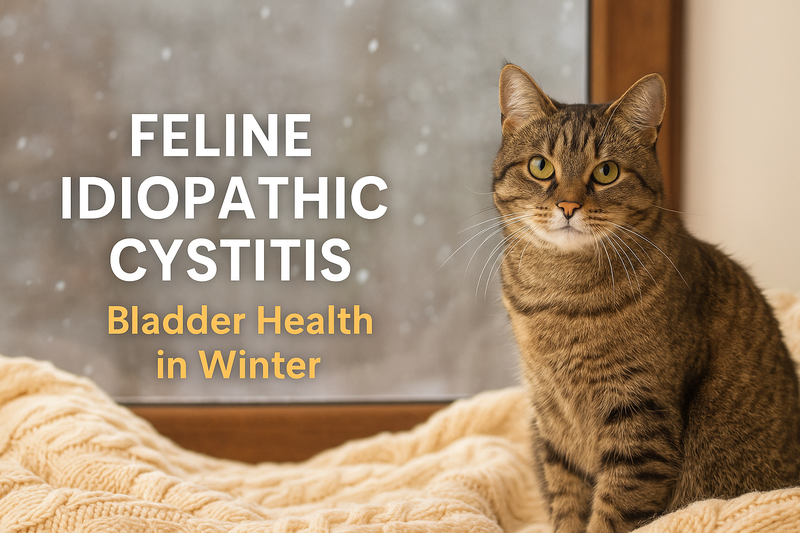After Hours
0408 512 323
Popular Posts
When Bottoms Go Wrong: Understanding Rectal ProlapseFeline Idiopathic Cystitis (FIC): Why Winter Brings More Trouble for Your Cat’s BladderCorns in GreyhoundsDon’t Let Ear Infections Become a Life-Long Problem for Your Dog: What You Can Do—and How We Can HelpKeeping Your Cat’s Vaccinations Up-to-Date
Feline Idiopathic Cystitis (FIC): Why Winter Brings More Trouble for Your Cat’s Bladder
As the weather cools down, many of us spend more time indoors—including our feline family members. But did you know that winter can also bring an increased risk of bladder issues in cats? One condition we commonly see at this time of year is Feline Idiopathic Cystitis (FIC)—a frustrating, painful, and sometimes dangerous bladder condition that affects many otherwise healthy cats.
At Eureka Veterinary Clinic, we want to help you understand what FIC is, why it happens, and—most importantly—how you can help manage and prevent it.
What is Feline Idiopathic Cystitis?
FIC is a sterile inflammation of the bladder, meaning it isn’t caused by bacteria. Instead, it’s linked to:
- Stress and anxiety
- Abnormal bladder lining (making the bladder more sensitive to irritation)
- Overactive nerves controlling the bladder
- Poor hydration and concentrated urine
Common signs of FIC include:
- Straining to urinate
- Frequent attempts to urinate with only small amounts passed
- Blood in the urine
- Peeing outside the litter tray
- Licking around the back end
- Crying or vocalising while trying to urinate
⚠️ If your cat can’t pass any urine at all, it’s an emergency—call us immediately. A blocked bladder can become life-threatening within hours.
Why Is FIC More Common in Winter?
Cats are creatures of habit and sensitive to environmental changes. Winter brings:
- Less activity
- Reduced water intake
- More time spent indoors (leading to boredom or stress)
- Changes in household routines (like visitors, heating, closed windows)
All these factors contribute to bladder irritation and stress—which are key triggers for FIC.
Why Is This So Important for Cats?
Cats are particularly vulnerable to FIC because of their unique urinary anatomy and behaviour:
- Small, highly concentrated urine volumes: Cats naturally produce small amounts of very concentrated urine, making the bladder wall more prone to irritation.
- Stress-sensitive species: Even small environmental changes can trigger stress in cats, leading to bladder inflammation.
- Higher risk of urinary blockages in males: Male cats have a narrow urethra that’s easily blocked if inflammation, bladder spasms, or crystals develop. This can rapidly become life-threatening.
What Happens If You Don’t Manage or Prevent FIC?
Ignoring FIC or failing to address risk factors can lead to:
- Ongoing pain and distress for your cat
- Repeated, stressful vet visits for flare-ups
- Permanent bladder damage from repeated inflammation
- Urethral obstruction (especially in male cats): where the cat physically cannot urinate. This is a veterinary emergency that may require hospitalisation, catheterisation, or even surgery.
- Behavioural problems: like inappropriate urination around the house, leading to stress for both you and your cat.
How Can You Help Prevent FIC Flare-Ups This Winter?
💧 Hydration, Hydration, Hydration
- Offer multiple water bowls in different locations.
- Try running water fountains.
- Feed wet (canned or sachet) food instead of dry food.
- Add water or low-sodium broth to meals.
🏡 Stress Reduction
- Keep routines consistent.
- Provide hiding spots, climbing areas, and window views.
- Use pheromone diffusers like Feliway.
- Engage in daily interactive play to help burn off stress.
🧼 Litter Tray Comfort
- Keep litter trays clean and easily accessible.
- Use low-dust, unscented litter.
- Have enough trays: one per cat, plus one extra.
🍽️ Diet Matters
Special veterinary urinary diets can help reduce bladder inflammation, control urinary pH, and encourage water intake.
Managing a Flare-Up
If your cat shows any signs of FIC, book an appointment immediately. Management may include:
- Pain relief
- Stress-reducing medications
- Dietary changes
- Fluid support
- Behavioural and environmental advice
Early intervention helps prevent things from escalating to an emergency.
Final Thought: Early Action Can Save Your Cat’s Life
FIC is painful, distressing, and can quickly become dangerous if untreated. The good news? With the right care, environment, and support, most cats with FIC can live happy, comfortable lives.
If your cat is showing signs of bladder discomfort—or if you want advice on preventing a flare-up this winter—give us a call.
Contact Us:
CLICK HERE for available times and bookingsBOOK ONLINE >
Location



